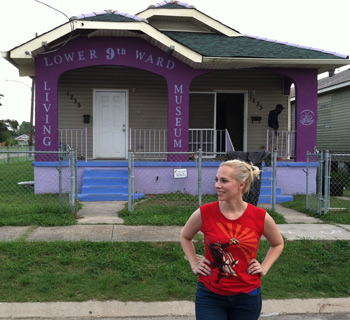Sexy Lies
By Edee Lemonier ’11
Gov. Palin was depicted in bikinis and took heat for her wardrobe, glasses and toenail polish color choices while running for office. Vulgar details of Sen. Clinton emasculating men, particularly her husband, were commonplace during the 2008 election.
Caroline Heldman was just a few weeks shy of her 15th birthday when she took the SATs through Johns Hopkins University, then enrolled at Clark College. She had been home-schooled, but rather than being intimidated by the number of people on campus or by being so young, she immediately embraced her surroundings.

Caroline Heldman ’91 volunteers to rebuild New Orleans, as well as her work as an associate professor of politics.
“I loved it,” she said. “Clark College was the place where I learned how big the world was.” She particularly appreciated being able to interact with people of all ages and diverse backgrounds.
Her exposure to a variety of people prepared her for later work in politics and gave her the critical thinking tools to question why women are treated differently than men in that field and in the media.
Up the ladder
Attending Clark College is a family tradition. Heldman ’91 graduated with an associate degree with her mother, who graduated from the Nursing program, and her sister Kathleen, who graduated from the Baking program. Of her five siblings, three sisters attended Clark.
After graduation she went to Washington State University Vancouver. Her senior thesis was on how BioEnergy Systems, a $6 million startup at the time, could better manage their company. As a result of her work, they hired her once she graduated with her business degree.
From BioEnergy Systems, Heldman went to Washington, D.C., to work for Rep. Joleen Unsoeld, D-Wash. As a congressional staffer, she worked on health care and environmental issues. She later moved to the New Jersey/New York area and took on the role of campaign manager and campaign consultant, while earning her doctorate in political science at Rutgers University.
Although she has worked for more women than men in the political arena, Heldman doesn’t see much difference between working for male candidates versus female. What she did find, however, was that there was “definitely a difference between how media treats male and female candidates.” The discovery led her to co-edit a book in 2007.
Media misogyny
“Rethinking Madame President: Are We Ready for a Woman in the White House?” edited by Heldman and Lori Cox Han, explores women’s barriers to the presidency and takes on the media’s intense focus on the novelty of a female candidate. Cameras and pundits, she said, tend to focus on hairstyles and toenail polish, instead of zeroing in on character and ability to lead.
Adding to her arsenal of qualitative data, Heldman led a study on how Sarah Palin and Hillary Clinton were treated by the media during the 2008 election cycle and found a pattern with all women in leadership roles. “We’re uncomfortable with women in power,” she explained, pointing to her Palin/Clinton study.
“Sarah Palin took the hyper-masculine route, while Hillary Clinton straddled the line.” The result was that Gov. Palin was depicted in bikinis and took heat for her wardrobe, glasses and toenail polish color choices. Meanwhile, the media honed in on Sen. Clinton’s laughing style – calling it a cackle – and described in vulgar detail how she emasculated men, particularly her husband. Both women were subjected to lewd name-calling with words generally used to degrade and weaken women.
Elections are ripe for “The sexist detritus that comes to the surface, [it is where] sexist stereotypes come up,” said Heldman.
[quote style=”boxed”]”We’re uncomfortable with women in power.” ~ Caroline Heldman, Ph.D.[/quote]Media misogyny isn’t only directed at women in politics.As a political commentator for Fox News, Fox Business, CNBC, MSNBC and Al Jazeera English, Heldman, 40, has experienced on-air sexist behavior from male correspondents.”Even when I bring up facts and statistics, they’re still dismissive. I still get chuckles.”
Following the publication of her book, Heldman was asked by the Women’s Media Center to work with them on the film “Miss Representation.” The piece dramatizes the media’s negative portrayal of girls and women. She worked with producers for a year as an advisor and made an appearance in the movie, as did Gloria Steinem, Condoleezza Rice, Nancy Pelosi, Rachel Maddow and Katie Couric. The film won Outstanding Documentary at the 2012 Gracie Allen Awards.
Being a part of the production was simultaneously liberating and humbling for Heldman. She credits her experiences at Clark College as the starting point for tuning her voice,taking risks, falling down and learning how to get back up.
“Clark College developed me as a person in so many different ways creatively, intellectually.” She likens her experience to a liberal arts college, where the professors are very much focused on students, not just on research. It’s unusual to find a community that focuses on that,” said the associate professor of politics at Occidental College in Los Angeles, where she chairs the politics department.
College gave Heldman permission to experiment. Discovery is what drove her, what angered her, what she was good at. It was the quintessential college approach.
“There were all of these opportunities outside the classroom to develop the whole person with extracurricular activities.” During her time at Clark she was student body president and vice president of activities. She was also involved with 10 different clubs, including the Martial Arts Club, Ski Club,Children’s Theater and Speech and Debate.
Grades suffer
From her home base in California, Heldman continues to fight misogyny and sexism in all forms of media. At a recent conference in San Diego, she gave the talk “The Sexy Lie” that challenges the notion that objectification empowers people,reminding her audience that an object is something that is used and is harmful when applied to humans.
Women’s bodies are the focus of objectification on television,in videos, advertisements and other media forms, she said. When women self-identify as objects, Heldman has found that their grades drop off. For college women, that can mean the difference between going to graduate school or not.
Heldman’s message about misogyny in the media goes beyond U.S. borders. She traveled to Serbia last summer to see firsthand how other countries perceive American media.”We export a lot of our media, so what affects us affects other countries, and we have a toxic media.”
One of the first steps to prevail against objectification of women is education. Clark College was Heldman’s launching point from which she focused her ambitions and charted a course for improving the lives of girls and women.
“I came from the bottom 10 percent, but I could prove myself,” she said. Heldman intends to do all that she can to assist others in their pursuit of healthy and productive lives.
Edee Lemonier ’11 is a writer based in Vancouver and a former fourth grade teacher.

